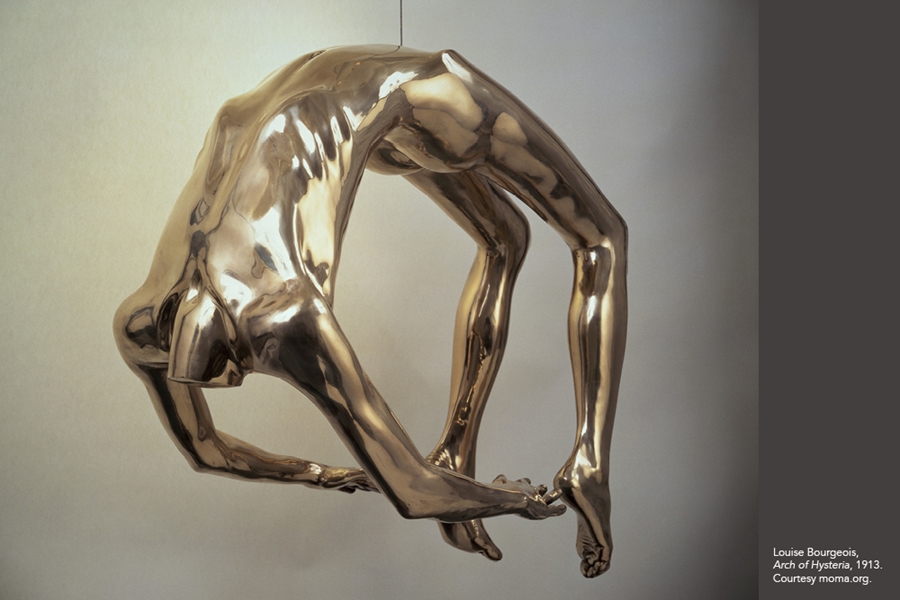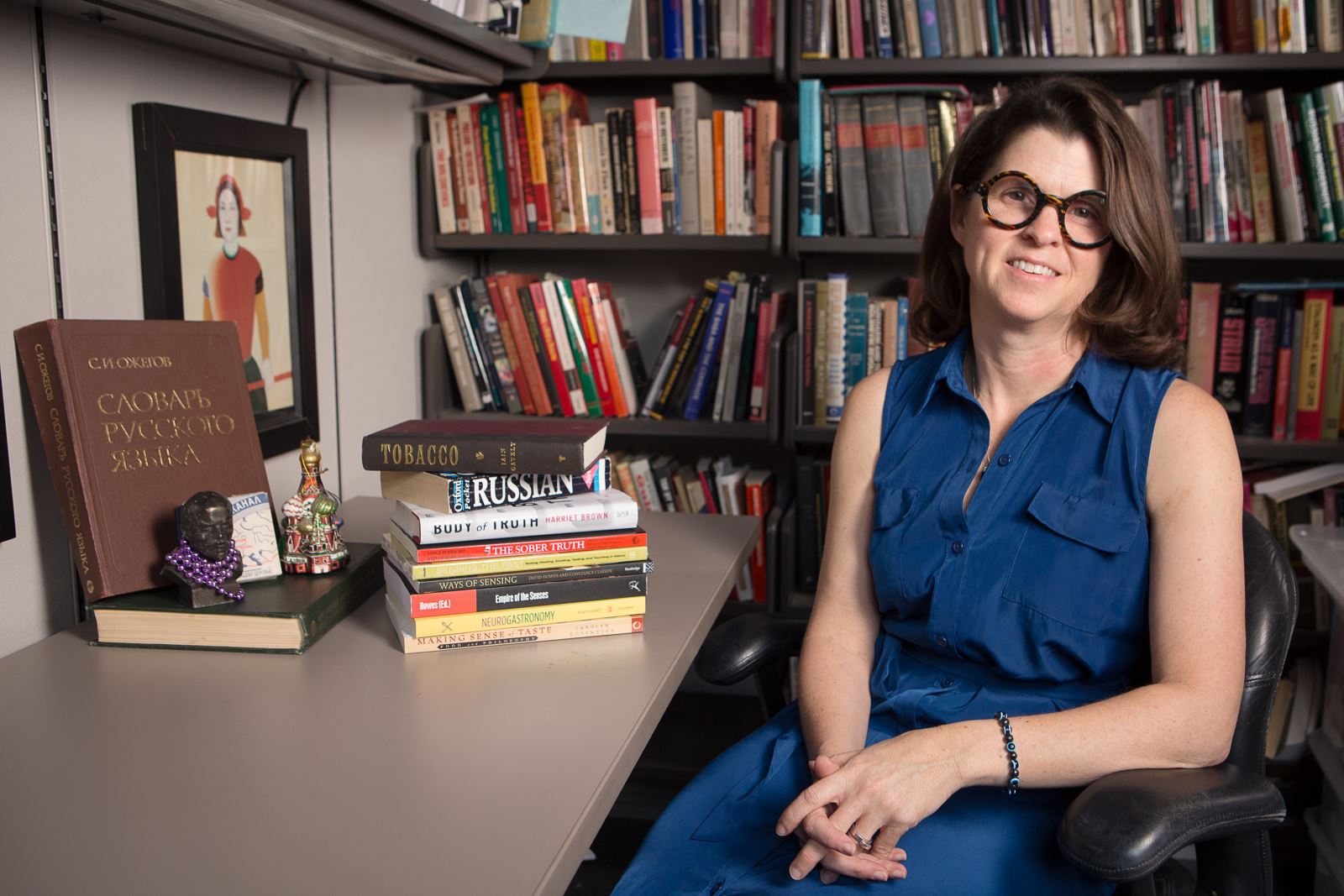
FAYETTEVILLE, Ark. – Tricia Starks, a professor of history in the J. William Fulbright College of Arts and Sciences, will explore how medical abuse or “bad medicine” has persisted and flourished in the modern era. She will give a lecture at 5:15 p.m. Wednesday, Feb. 5, in the Gearhart Hall Auditorium, room 26. “Bad Medicine” will be the first of four lectures offered in February that preview Fall 2020 Honors College Signature Seminars.
The concept of “bad medicine” summons up visions of medieval bleedings, blisterings, cauterizations and other practices where doctors failed to follow the Hippocratic dictum to “first do no harm.” But medical abuse has persisted and flourished in the modern era, from the overprescription of opioids to unequal treatment based on race and gender.
“In the past hundred years we’ve seen a triumph in public health – we’ve come a long way,” Starks said. “But there have also been times when medicine goes bad.”
Honors College Fellow Susan Tucker, a biology and French double major who plans to go into medicine, took the ‘Bad Medicine’ seminar when it was first offered in 2018.
“I thought it would be important to know mistakes that physicians have made in the past, so I could be a better physician in the future,” Tucker said. “I’ve already used what I’ve learned in my experience shadowing doctors.”
Starks believes her class will help those who attend become better doctors.
“We know there are great disparities in treatment today for people of different ethnicities, for women experiencing pain or heart disease,” she said. “Some of these differences come from inherent biases within medical training. Hopefully my students, as they have this exposure, will understand where these biases come from and will be able to move forward and be better practitioners.”
‘BAD MEDICINE’ THROUGH THE YEARS
Starks points to the sensational 1936 trial when socialite Anne Cooper Hewitt sued her mother for having her sterilized at age 20, without her consent.
“She was taken in for stomach pain, and thought she’d got an appendectomy, but instead she was sterilized,” Starks said. “Her mother had made the case that she was an imbecile because she was a little too flirtatious with men. The woman could read and write in three different languages. She was an international traveler and she was incredibly well spoken, but her entire reproductive life was taken away from her by her mother as a way to secure her fortune.”
African Americans have also experienced a kind of medical apartheid since the antebellum era. The infamous Tuskegee Syphilis Experiment (1932-1972), which followed the progression of untreated syphilis in African American sharecroppers in Alabama under the guise of receiving free health care from the U.S. government.
More recently, connections have been drawn between high-profile philanthropy and high-profit OxyContin, which has ushered in an epidemic of opioid addiction and deaths by overdose.
 Tricia Starks joined the history department at the University of Arkansas in 2000 and has taught courses in the history of medicine, world history, Russian and Soviet history, and gender history. Starks is a member of the University of Arkansas Teaching Academy and has been named a Master Teacher in Fulbright College and a Student Alumni Board Teacher of the Year. Starks’s primary area of expertise is the history of medicine in Russia and the Soviet Union. She is author of The Body Soviet: Propaganda, Hygiene, and the Revolutionary State (University of Wisconsin Press, 2008) and Smoking under the Tsars: A History of Tobacco in Imperial Russia. (Cornell University Press, 2018). She is currently completing a manuscript on tobacco use in the Soviet period.
Tricia Starks joined the history department at the University of Arkansas in 2000 and has taught courses in the history of medicine, world history, Russian and Soviet history, and gender history. Starks is a member of the University of Arkansas Teaching Academy and has been named a Master Teacher in Fulbright College and a Student Alumni Board Teacher of the Year. Starks’s primary area of expertise is the history of medicine in Russia and the Soviet Union. She is author of The Body Soviet: Propaganda, Hygiene, and the Revolutionary State (University of Wisconsin Press, 2008) and Smoking under the Tsars: A History of Tobacco in Imperial Russia. (Cornell University Press, 2018). She is currently completing a manuscript on tobacco use in the Soviet period.
Signature Seminars Schedule
Starks’ “Bad Medicine” is one of four Honors College Signature Seminars scheduled for fall 2020. Other topics will include:
- Animal Minds, taught by Ed Minar, professor and chair in the Department of Philosophy
- Intimacies, taught by Lisa M. Corrigan, associate professor of communication and director of the Gender Studies Program
- Little Things that Changed the World, taught by Chaim Goodman-Strauss, professor of mathematics
Deans of each college may nominate professors to participate in this program, and those who are selected to teach will become Dean’s Fellows in the Honors College. The Honors College brings in leading scholars from other institutions to teach some of these courses, as well. For example, Elizabeth Hellmuth Margulis, professor of music at Princeton University, will lead a fifth Signature Seminar, Brain and Music, during the August 2020 intersession.
Honors students must apply to participate, and those selected will be designated Dean’s Signature Scholars. The course application is posted online on the Signature Seminars web page. The deadline to apply is 11:59 p.m. Friday, April 3.
About the Honors College: The University of Arkansas Honors College was established in 2002 and unites the university’s top undergraduate students and professors in a learning environment characterized by discovery, creativity and service. Each year the Honors College awards up to 90 freshman fellowships that provide $72,000 over four years, and more than $1 million in undergraduate research and study abroad grants. The Honors College is nationally recognized for the high caliber of students it admits and graduates. Honors students enjoy small, in-depth classes, and programs are offered in all disciplines, tailored to students’ academic interests, with interdisciplinary collaborations encouraged. Fifty percent of Honors College graduates have studied abroad and 100 percent of them have engaged in mentored research.
About the University of Arkansas: The University of Arkansas provides an internationally competitive education for undergraduate and graduate students in more than 200 academic programs. The university contributes new knowledge, economic development, basic and applied research, and creative activity while also providing service to academic and professional disciplines. The Carnegie Foundation classifies the University of Arkansas among fewer than 3% of colleges and universities in America that have the highest level of research activity. U.S. News & World Report ranks the University of Arkansas among its top American public research universities. Founded in 1871, the University of Arkansas comprises 10 colleges and schools and maintains a low student-to-faculty ratio that promotes personal attention and close mentoring.
Topics
Contacts
Kendall Curlee, director of communications
Honors College
479-575-2024,
kcurlee@uark.edu